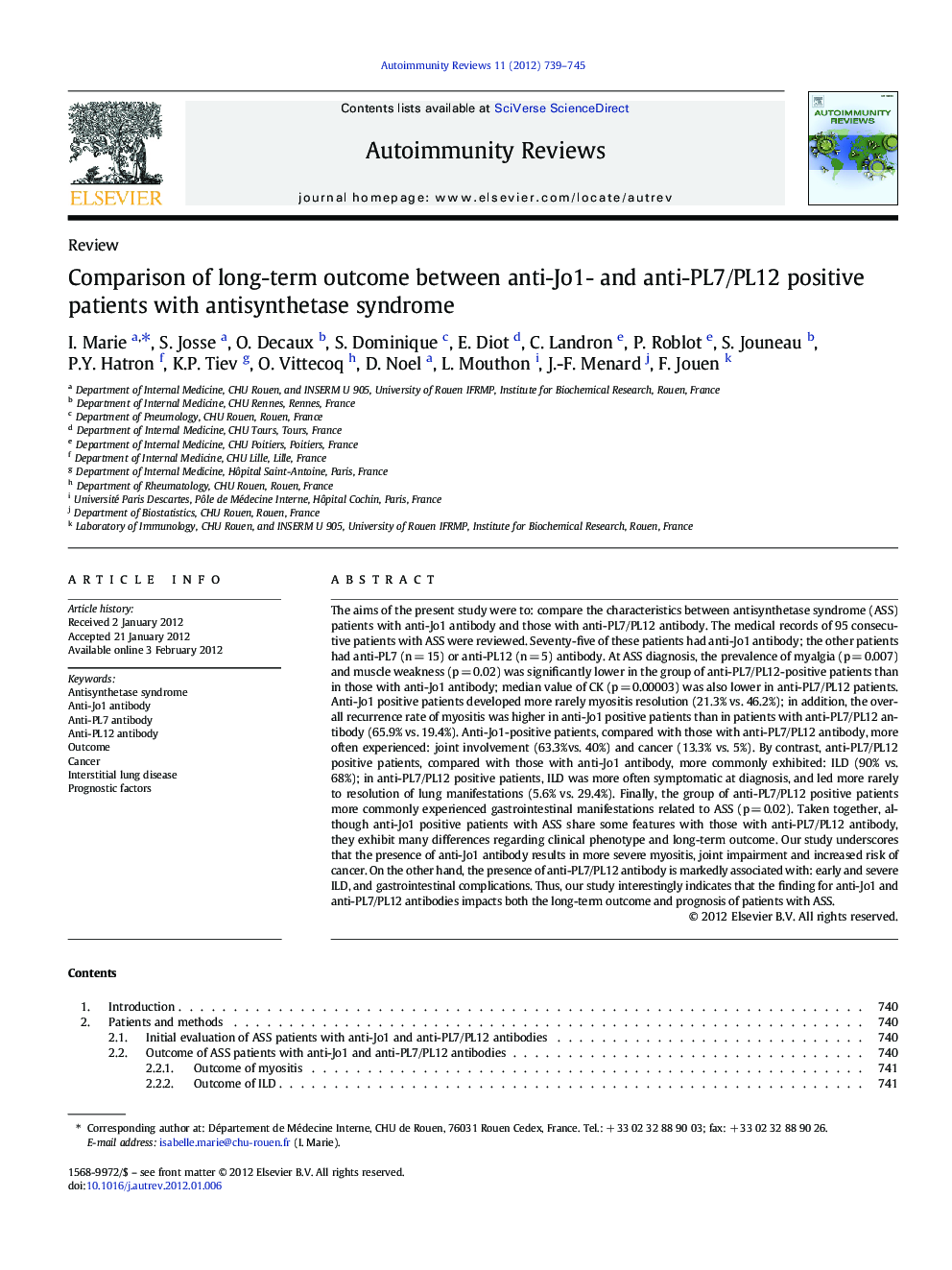| کد مقاله | کد نشریه | سال انتشار | مقاله انگلیسی | نسخه تمام متن |
|---|---|---|---|---|
| 6114546 | 1214222 | 2012 | 7 صفحه PDF | دانلود رایگان |
عنوان انگلیسی مقاله ISI
Comparison of long-term outcome between anti-Jo1- and anti-PL7/PL12 positive patients with antisynthetase syndrome
دانلود مقاله + سفارش ترجمه
دانلود مقاله ISI انگلیسی
رایگان برای ایرانیان
کلمات کلیدی
موضوعات مرتبط
علوم زیستی و بیوفناوری
ایمنی شناسی و میکروب شناسی
ایمونولوژی
پیش نمایش صفحه اول مقاله

چکیده انگلیسی
The aims of the present study were to: compare the characteristics between antisynthetase syndrome (ASS) patients with anti-Jo1 antibody and those with anti-PL7/PL12 antibody. The medical records of 95 consecutive patients with ASS were reviewed. Seventy-five of these patients had anti-Jo1 antibody; the other patients had anti-PL7 (n = 15) or anti-PL12 (n = 5) antibody. At ASS diagnosis, the prevalence of myalgia (p = 0.007) and muscle weakness (p = 0.02) was significantly lower in the group of anti-PL7/PL12-positive patients than in those with anti-Jo1 antibody; median value of CK (p = 0.00003) was also lower in anti-PL7/PL12 patients. Anti-Jo1 positive patients developed more rarely myositis resolution (21.3% vs. 46.2%); in addition, the overall recurrence rate of myositis was higher in anti-Jo1 positive patients than in patients with anti-PL7/PL12 antibody (65.9% vs. 19.4%). Anti-Jo1-positive patients, compared with those with anti-PL7/PL12 antibody, more often experienced: joint involvement (63.3%vs. 40%) and cancer (13.3% vs. 5%). By contrast, anti-PL7/PL12 positive patients, compared with those with anti-Jo1 antibody, more commonly exhibited: ILD (90% vs. 68%); in anti-PL7/PL12 positive patients, ILD was more often symptomatic at diagnosis, and led more rarely to resolution of lung manifestations (5.6% vs. 29.4%). Finally, the group of anti-PL7/PL12 positive patients more commonly experienced gastrointestinal manifestations related to ASS (p = 0.02). Taken together, although anti-Jo1 positive patients with ASS share some features with those with anti-PL7/PL12 antibody, they exhibit many differences regarding clinical phenotype and long-term outcome. Our study underscores that the presence of anti-Jo1 antibody results in more severe myositis, joint impairment and increased risk of cancer. On the other hand, the presence of anti-PL7/PL12 antibody is markedly associated with: early and severe ILD, and gastrointestinal complications. Thus, our study interestingly indicates that the finding for anti-Jo1 and anti-PL7/PL12 antibodies impacts both the long-term outcome and prognosis of patients with ASS.
ناشر
Database: Elsevier - ScienceDirect (ساینس دایرکت)
Journal: Autoimmunity Reviews - Volume 11, Issue 10, August 2012, Pages 739-745
Journal: Autoimmunity Reviews - Volume 11, Issue 10, August 2012, Pages 739-745
نویسندگان
I. Marie, S. Josse, O. Decaux, S. Dominique, E. Diot, C. Landron, P. Roblot, S. Jouneau, P.Y. Hatron, K.P. Tiev, O. Vittecoq, D. Noel, L. Mouthon, J.-F. Menard, F. Jouen,